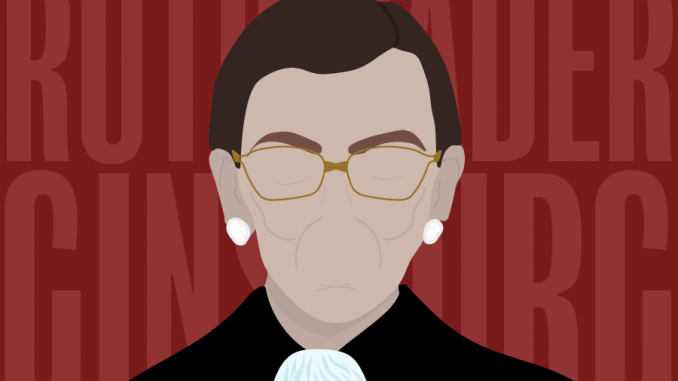
A single tear rolled down my cheek as I sat on the cold, hard floor of my roommate’s bedroom last Friday. My phone lit up with half a dozen notifications, all repeating the same devastating message: Supreme Court Justice Ruth Bader Ginsburg was dead.
Just moments before, the future of the United States was a bit more optimistic. With Ginsburg still on the bench, LGBTQ people’s and women’s rights felt secure. Even in the weeks before her passing, she said she was “looking forward to brighter days,” CNN reported.
Justice Ginsburg’s dedication to equality for women, immigrants, the disabled and minorities was the result of growing up as a Jewish girl at the same time as the Holocaust, the Washington Post reported.
The 87-year-old’s Jewish faith was yet one more thing I could relate to.
In Judaism, our actions in life are considered extremely important in how we experience death. Jewish people do not believe in heaven or hell. But there are many interpretations of the Torah explaining what comes after life.
Although there is no way for me to know what Justice Ginsburg believed, I know that the fact her death came on Rosh Hashanah, the celebration of the Jewish New Year and God’s creation of the world, has now made her a “tzadik,” or a righteous person, as the faith says.
On the floor of my room, so many emotions were running through my mind. The timing of her death is inauspicious, especially as Republicans are strategizing how to replace her Supreme Court seat, and Democrats are planning to oppose their nominee before she is even put to rest.
There are so many things that I loved and respected when it came to the life of Justice Ginsburg. She was passionate about education, equal rights and the separation of church and state.
Justice Ginsburg’s tenacity is part of the reason women can serve on juries, marriage is not reserved for a man and a woman, women are not fired from their jobs for becoming pregnant, women can sign a mortgage or have a bank account without a male co-signer and state funded schools can admit women, USA Today reported.
Earlier this summer, I wrote two letters to Justice Ginsburg because she made me a better person, and I wanted her to know how grateful I am for her perseverance.
In my letters, I wished her well in her battle against her pancreatic cancer, and I told her how much I admired her determination to keep working while simultaneously fighting for her life.
Writing my third and final letter was the only way I could properly say goodbye. I had to make it count.
The fervor of my beliefs radiated through my pen. Once I started, I couldn’t stop until I had flipped through eight pages.
In this letter, I said one last time how much her life meant and still means to me. I iterated how much she had inspired me to be the person I am today.
I wrote to her knowing she wouldn’t be physically reading it. But it was my way of mourning and healing. I couldn’t find closure by posting on Instagram or Twitter. It had to be pen to paper.
I sent the letter to her office, hoping it would get there in time for someone to receive it. I thought of who was going to read it, if anyone. If whoever reads my letter worked alongside Justice Ginsburg, then perhaps they will find comfort knowing they helped make a difference in the lives of others as well.
In Judaism, there’s a belief that one’s soul can never die. Justice Ginsburg was the epitome of strength and charisma. Her progressive spirit will live on with future generations.
I hope to impact others’ lives the way she impacted mine. I wish to share ideas that support the proverbial “pursuit of happiness,” open myself up to others’ points of view and create a space of love and acceptance.
It brings me solace that even though I will not get a reply to my letter, I was able to express my appreciation of Justice Ginsburg and let her know my life is one of millions she positively influenced.
May the memory of Justice Ruth Bader Ginsburg — the second woman on the Supreme Court, the first female tenured professor at Columbia University, one of only nine women in her class of more than 500 at Harvard Law, the first female member of the Harvard Law Review and the survivor of four different bouts with cancers — be a blessing and a revolution.
After nearly three decades of service on the Supreme Court, she is now, in the eyes of her faith, an eternal judge.


Be the first to comment